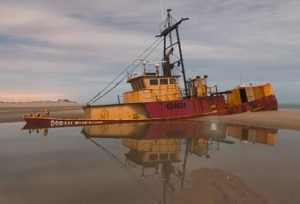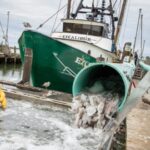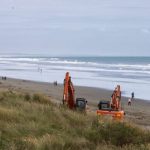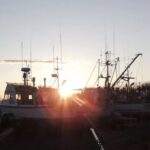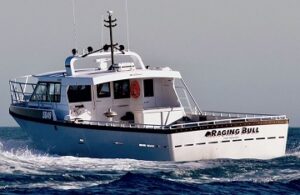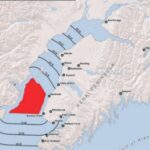Tag Archives: Marsden Brewer
Maine researchers, students are sorting through muck and slugs to study baby scallops
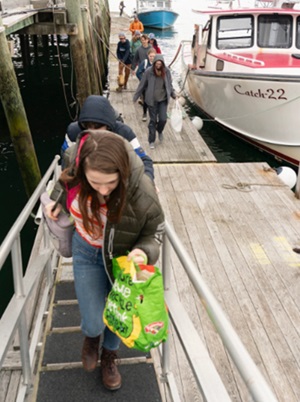 People from each of these groups are collaborating with the Maine Center for Coastal Fisheries, Hurricane Island Center for Science and Leadership and Colby College in the second year of a study meant to help identify how many young scallops there are off Maine’s coast, and where they’re living. The tiny, two-shelled juveniles, or spat, are uniquely important to fishermen who scoop wild scallops from the ocean floor and aquaculture farmers who raise them in contained areas. Unlike most aquaculture farmers who work with other species, scallop farmers can only grow their bounty from wild spat – the same spat that wild scallop fishermen need to feed the general population. Photos, more, >>click to read<< 12:50
People from each of these groups are collaborating with the Maine Center for Coastal Fisheries, Hurricane Island Center for Science and Leadership and Colby College in the second year of a study meant to help identify how many young scallops there are off Maine’s coast, and where they’re living. The tiny, two-shelled juveniles, or spat, are uniquely important to fishermen who scoop wild scallops from the ocean floor and aquaculture farmers who raise them in contained areas. Unlike most aquaculture farmers who work with other species, scallop farmers can only grow their bounty from wild spat – the same spat that wild scallop fishermen need to feed the general population. Photos, more, >>click to read<< 12:50
A behind-the-scenes look at Maine’s growing scallop farming industry
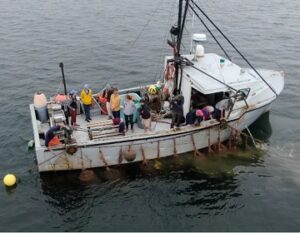 Maine’s wild scallop harvest is still a few months away, but a group of fishermen in Penobscot Bay can fish scallops year-round thanks to Maine’s growing aquaculture industry. “This just puts another tool in the toolbox to allow them to adapt. We’re not looking to be replaced. We just want the opportunity to adapt,” said scallop farmer, Marsden Brewer. Marsden has been fishing off of Stonington for decades. He and his son, Robert, have been learning more about scallop farming, setting their nets in Penobscot Bay. Due to reduced stocks and an increase in commercial fishing regulations, this new way of doing business has given fishermen like Marsden hope for the future. >click to read< 17:07
Maine’s wild scallop harvest is still a few months away, but a group of fishermen in Penobscot Bay can fish scallops year-round thanks to Maine’s growing aquaculture industry. “This just puts another tool in the toolbox to allow them to adapt. We’re not looking to be replaced. We just want the opportunity to adapt,” said scallop farmer, Marsden Brewer. Marsden has been fishing off of Stonington for decades. He and his son, Robert, have been learning more about scallop farming, setting their nets in Penobscot Bay. Due to reduced stocks and an increase in commercial fishing regulations, this new way of doing business has given fishermen like Marsden hope for the future. >click to read< 17:07
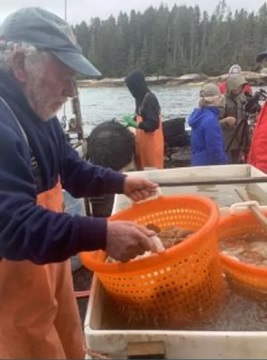
Maine’s scallop industry is offering fishermen new opportunities at sea
Marsden Brewer is a fourth-generation fisherman who still fishes for lobster. However, reduced stocks and an increase in commercial fishing regulations have led to a decrease in fishing opportunities. Marsden’s son, Bob, wanted a career working on the ocean; Marsden looked for other opportunities and saw the potential in sea scallop farming. Marsden said, “in order for a waterfront to stay alive, you gotta be having something to sell. You gotta be landing in product. You gotta bring new money into your community. And this does it, same as lobsters.” Together, Marsden and Bob created their company and have reached the point of making weekly deliveries throughout Maine coastal communities. They have plans to expand production to further meet existing demand. >click to read< 10:11
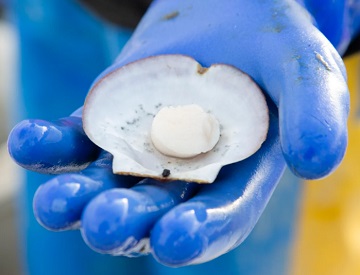
As Maine’s climate changes, scallop farming offers optimism
“One of the reasons we started farming scallops was because even though there’s a hesitancy for most people to admit it, there’s an awful lot of storms on the horizon for the lobster industry,” said Alex de Koning, of Bar Harbor-based mussel and oyster farm Acadia Aqua Farms. “It’s a tough nut to crack, but if you crack it, your potential benefits are just tremendous.”,, Marsden Brewer, owner of PenBay Farmed Scallops in Stonington, has been a commercial fisherman for most of his life. When his son, Bob, was in high school, Brewer worried about what the future would hold. Neither ground fishing nor lobstering seemed like a stable occupation,,, “I got tired of worrying about limitations,” he said. “I wanted to do something where I could maybe realize my potential.” >click to read< 13:11
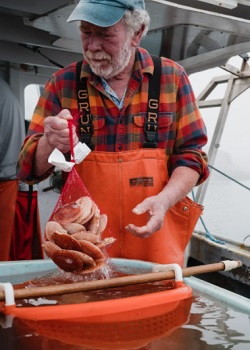
There are only a handful of scallop farms in the United States, but most are in Maine.
Marsden Brewer kicked a 38-foot lobster boat into the middle of Penobscot Bay. Brewer and his son Bob pulled up a long net covered with algae and scooped scallops into a bucket of seawater. There, the bivalves moved much faster than I had imagined. Most go to Gliden Point Oyster Farm. The rest was about to be lunch. Brewer, a third-generation commercial fisherman, has witnessed the instability of the wild fisheries around him, witnessing fluctuations in the catch of red-spotted shrimp and the scarcity of cod, sea urchin and shrimp stocks that were once abundant. I witnessed. >click to read< 09:10
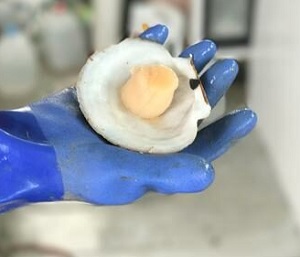
Large Scale Fin-Fish and Aquatic Farms Could Hamper Maine Aquaculture Industry
As proposed, the Nordic Aquafarms project would raise more than 72 million pounds of salmon annually on its 56–acre campus in Belfast, Maine. The site would utilize about 5,200 gallons of water per minute, a combination of both saltwater taken from the nearby Gulf of Maine and freshwater obtained from groundwater wells, city-owned aquifers and reservoirs. The permit application indicates the facility would discharge more than 7 million gallons of filtered wastewater into the Belfast Bay each day. It’s that last figure that concerns many local residents. Marsden Brewer is a commercial fisherman and scallop farmer who also serves as president of the Maine Aquaculture Co-op. Brewer was one of more than a dozen fishermen and fish farmers who spoke out against the Nordic project at a statewide hearing this spring. “After years of misuse, we’re finally starting to see a lot of good things happening in this bay,” Brewer says. >click to read< 09:56
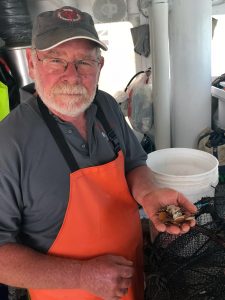
Why Maine Lobstermen Are Looking To Farmed Scallops To Stay Afloat
Marsden Brewer is a third-generation Maine fishermen who docks in Stonington. “I’ve been involved in all the fisheries over my lifetime,” he says. These days it’s mostly lobster, but he has fished cod and shrimp, and carted urchin to market. They were all once-vibrant species, but now they’re mostly off-limits after being overfished and weakened by climate change. “I’ve seen the collapse and been part of the collapse of most of the fisheries. Not intentionally, but just the way it was set up to work it wasn’t sustainable, and this project here is looking at sustainability in a fishery,” he says. The project Brewer refers to is a 20-year effort to diversify his business by developing a profitable scallop farm. >click to read<12:53
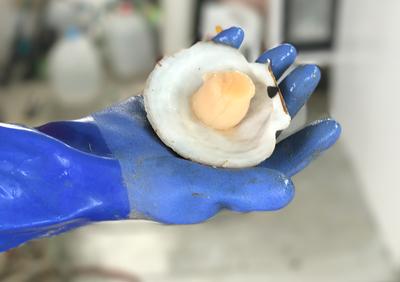
Maine: Scallop farm first of its kind in local waters
Just about one year after father-and-son fishermen Marsden and Bob Brewer returned from Japan, where they learned new scallop-farming techniques firsthand, Bob Brewer was granted a 3.23 acre experimental aquaculture lease southwest of Andrews Island. It is the first scallop farm of its kind in Penobscot Bay. The Brewers can grow up to 200,000 Atlantic sea scallops using lantern nets, where mesh nets, each 10 floors deep, hang from a 600-foot longline. “It’s a big circular tube with floors,” Bob Brewer said. “They’re used in Japan. That’s where we learned how to do it.” click here to read the story 10:42

The shortest route between Maine and Japan: scallops
Last month, lobstermen Marsden Brewer and his son, Bobby, joined a delegation of Maine fishermen and aquaculturists on a visit to Aomori on the northern coast of Japan’s major island to learn about the latest techniques for cultivating scallops. Among their hosts was Hiroaki Sugiyama, an inventor and manufacturer of high-tech machinery used in Japan’s enormous scallop aquaculture industry. On Monday, the Brewers returned the favor. Sugiyama arrived in the U.S. Sunday night for a four-day visit to learn about what is happening in Maine’s nascent scallop aquaculture industry. After a stop at a newly-formed aquaculture cooperative in Spruce Head, and a boat ride to visit an experimental scallop growing operation, Sugiyama and his Maine hosts traveled to Stonington for more talk about scallop aquaculture, and a terrific lunch, hosted by Marsden and Donna Brewer at their Red Barn Farm. Read the article here 18:54

































